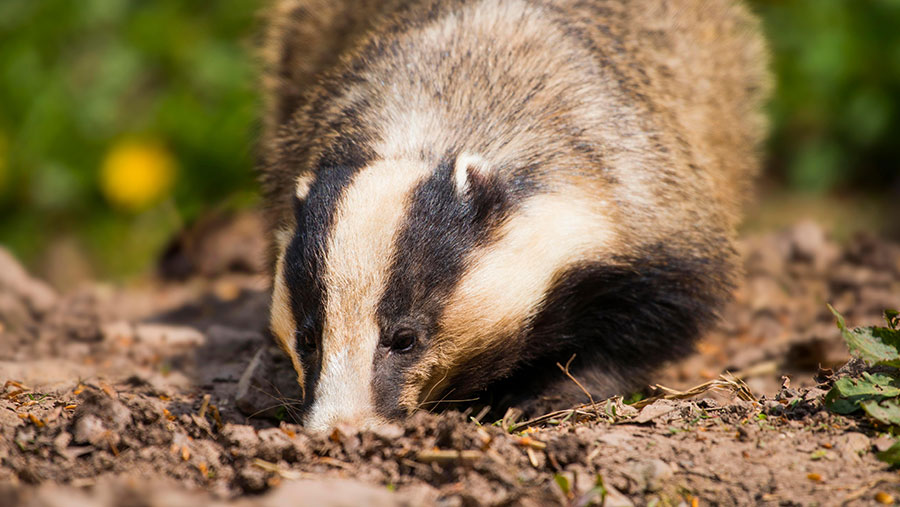Defra plans no new badger culling licences after 2022
 © Frank Sommariva/imageBROKER/Shutterstock
© Frank Sommariva/imageBROKER/Shutterstock Defra is proposing an end to badger cull licences for new areas of England after 2022, as part of the next phase of its bovine TB eradication strategy.
The plan is among new measures included in a government consultation launched by Defra secretary George Eustice on Wednesday (27 January).
Defra is proposing to stop issuing intensive cull licences for new areas after 2022, and new licences could also be cut short after two or three years based on a review of the latest scientific evidence at that time.
See also: No ‘silver bullet’ cattle vaccine to beat bovine TB
Meanwhile, any new supplementary cull licences – which are granted in regions after intensive culls are complete – would be restricted to two years and would not be reissued afterwards.
Defra will also be seeking to accelerate the deployment of a TB cattle vaccine and to support badger vaccination in areas that have completed culls as an alternative to supplementary culling.
“Our badger control policy has helped to turn the tide on this disease, but no wants to continue the cull of badgers for a moment longer than necessary,” said Mr Eustice.
“We are working to accelerate other elements of our strategy to improve diagnostics and develop a deployable cattle vaccine so we can phase out the culling of badgers.”
TB cattle vaccine
A deployable cattle vaccine will be a powerful tool in the fight against bovine TB, Defra says. And it would provide another major step forward in the government’s strategy to phase out intensive culling.
A programme of detailed badger surveillance and genome sequencing is under way, meaning it has already been made possible to move away from culling to vaccination in part of one area this year.
Last summer, Defra announced the plan for TB cattle vaccination trials in England and Wales following a major breakthrough by government scientists on a potential new TB test. These trials, which will start in the coming months, will enable work to accelerate towards planned deployment of a cattle vaccine by 2025.
The government is also calling for views on possible future measures to accelerate bovine TB eradication in England, such as further improvements to testing, encouraging increased uptake of farm biosecurity measures and supporting responsible cattle movements.
Godfray review
The eight-week consultation seeks views on a range of proposals following the government’s response to an independent review of its 25-year bovine TB strategy, led by Sir Charles Godfray.
The government’s response to the Godfray Review outlined the need for a combined approach which includes improved cattle movement controls, better diagnostic tests and cattle vaccination to eradicate the disease in England by 2038.
Bovine TB is one of the most difficult and intractable animal health challenges that England faces today. In the past year, more than 27,000 cattle in England have been slaughtered to tackle the disease, causing significant distress to farming communities.
Badger culling must only be replaced by proven alternative, warns NFU
The government’s 25-year bovine TB eradication strategy has provided “real hope” for farmers in England who have suffered huge mental, emotional and financial turmoil from the crippling disease, the NFU says.
But badger culling has played an enormous role in tackling the disease – and Defra’s own consultation shows incidents of TB in cull areas have dropped by 51% after four years of culling, noted NFU deputy president Stuart Roberts.
“This clearly shows that, in line with the Randomised Badger Culling Trial, the badger culls are working and that it is essential to keep our focus on eradicating this dreadful disease and using every tool in the box to do so,” he added.
The NFU said a science and evidence-based approach must continue to drive the government’s approach to TB eradication in cattle. But it warned Defra that eight years of progress of tackling this disease could be undermined by “taking its foot off the gas when it comes to controlling a disease”.
The NFU said it was “heartening” to hear that field trials for a TB cattle vaccine would soon get underway. And farmers will be hoping that a fully-authorised cattle vaccine can soon become another vital tool in eradicating this dreadful disease.
But Mr Roberts said there was “not a single solution” to eradicating bovine TB and “all the tools in the toolbox” must be used.
He added: “If the government wants to phase out one successful measure, it must be 100% satisfied that any changes to replace it with an alternative must be proven to be equally effective.”
